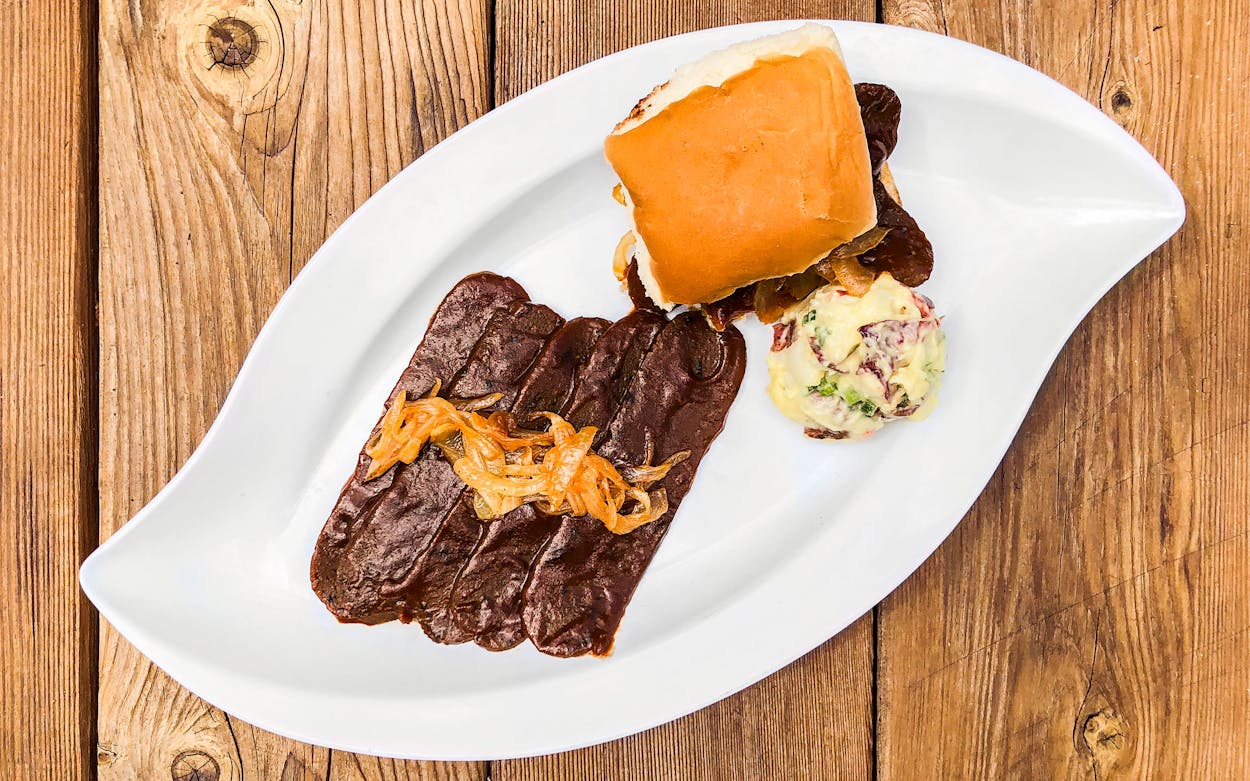“Are you ready to start your plant-based journey?” asked Susann Glenn, manager of communications for Housing and Dining at Rice University, opening the door into the West Colleges Servery. It’s one of many dining halls on the Houston campus, but this one is on a mission. Senior executive chef Roger Elkhouri has developed vegan versions of various meats, although he uses the term “plant-based” instead. “It’s for everybody, not just for vegans,” said Elkuori, who creates non-meat versions of dishes like ham, corned beef, pastrami, and, most recently, brisket.
As I entered the dining hall, I was skeptical. I have plenty of misgivings about appropriating meat terms to make vegan dishes sound more appealing. Like so many culinary misnomers—grilled shrimp aren’t fajitas, and almonds certainly don’t produce milk—the phrasing is a way to sell a less familiar alternative. “Vital wheat gluten loaf” likely wouldn’t make it off the shelves in Texas, but “plant-based brisket” has a shot. Here at Rice, the culinary team admits it’s “a marketing tool” to get students to try new items before dismissing them. (Same goes for the kitchen’s Instagram hashtag, #ourplantbasedjourney.) Exploring new ideas is what college is all about, right?
Elkhouri began his own plant-based brisket journey a year ago. He’d already developed plant-based versions of meats, including ham, turkey, and sausage, and he wanted to add a new barbecue dish to the menu. When his first plant-based brisket emerged from the oven looking suspiciously purple, he knew some adjustments were in order. Along with the taste and texture, it had to mimic the look of brisket too. After many failed iterations, he settled on a recipe that’s 95 percent vital wheat gluten (wheat with all the starch removed, leaving behind only the gluten). That’s mixed with water, spices, porcini mushroom powder (for an umami taste), and liquid smoke. It’s baked slowly rather than smoked, although there is a smoker on site that he uses for chicken and the occasional beef brisket.
At the serving line, we walked past the prime rib carving station to read the plant-based menu. “BBQ Smoked Brisket Sliders” were the day’s selection, and it was only the second time they’d been offered. I tried a slice of vegan brisket without the bun. It pulled apart easily. Elkhouri said the biggest challenge was to keep it from becoming rubbery. Black pepper was the most pronounced flavor, and there wasn’t much else that stood out. Thankfully the liquid smoke had been used sparingly. Essentially, this was a blank canvas. The texture was far more important than the flavor—since the finished product was covered in a thick barbecue sauce and caramelized onions, the “brisket” didn’t have to stand on its own. It ends up not being any more offensive than a passable chopped beef sandwich at an average barbecue joint.
Elkhouri stressed that he’s not trying to turn students into vegans or even eliminate meat from the menu. Rice’s campus food is highly rated, and the dining team would like to keep it that way. The plant-based options are a result of inclusivity, not exclusivity: many of Rice’s international students don’t eat meat, so Elkhouri’s brisket might be their only option for a bite of Texas barbecue, however distorted it might be. (For that reason, he creates plant-based dishes that don’t rely on peanuts or cashews for texture, so diners with nut allergies can enjoy them.)
Elkhouri attributes his philosophy about nontraditional meat dishes to his upbringing in Lebanon. “We never thought of hummus and pita bread as vegan,” he said. Instead, his family saw the many plant-based dishes served alongside grilled and roasted meats as just food.
He hopes Rice students will be equally open-minded. Elkhouri considers it a success when they have both the meat option and the plant-based protein on their trays. “When I see that, I think the mission is complete,” he said.
Elkhouri sees a broader transition towards less meat consumption as inevitable. “The future is plant-based,” he said. Since products like nutritional yeast have hit the shelves at grocery store chains, he reasons, meat replacements have officially made their way into the mainstream. His perspective is backed up by science: as the warming planet requires significant changes to meat production (according to a dire report released earlier this week by the UN’s Intergovernmental Panel on Climate Change, halting the warming of the planet to a non-catastrophic level “would require rapid, far-reaching and unprecedented changes in all aspects of society”), we’ll likely see many more plant-based meat substitutes. Meanwhile, Elkhouri will continue innovating with his contributions. At the end of lunch, he headed back to the kitchen to work on new versions of plant-based pork ribs and pork belly, which is particularly difficult because of the layers of fat and meat that he’ll need to mimic. “The pork belly is two-dimensional,” said the frustrated chef. “It needs a lot of work.”
- More About:
- Rice University








